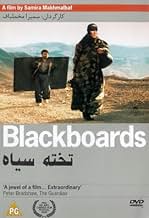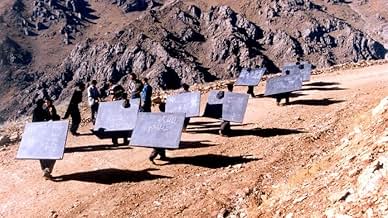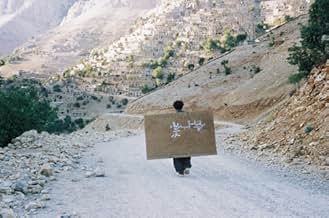VALUTAZIONE IMDb
6,8/10
2996
LA TUA VALUTAZIONE
Aggiungi una trama nella tua linguaKurdish teachers Said and Reeboir roam Iranian villages near Iraqi border during war. Said guides displaced men, marries widow Halaleh. Reeboir joins child smugglers. Amid danger, they try t... Leggi tuttoKurdish teachers Said and Reeboir roam Iranian villages near Iraqi border during war. Said guides displaced men, marries widow Halaleh. Reeboir joins child smugglers. Amid danger, they try teaching nomadic students while soldiers patrol.Kurdish teachers Said and Reeboir roam Iranian villages near Iraqi border during war. Said guides displaced men, marries widow Halaleh. Reeboir joins child smugglers. Amid danger, they try teaching nomadic students while soldiers patrol.
- Regia
- Sceneggiatura
- Star
- Premi
- 3 vittorie e 3 candidature totali
Recensioni in evidenza
Blackboards is a very good film: well acted and engaging. The story is fresh: a group of Iranian teachers with blackboards on their backs, trying to each undereducated Kurdish refugees how to read, write, count, et cetera.
The film is filled with endearing characters: a sharp young boy working as a mule, a teacher desperately trying to teach those around him, an old man with urinary problems, a woman whose chaotic life has been extremely painful and just wants to be able to hold on to her son. Samira Makhmalbaf has revealed herself as a humane filmmaker with a good eye for drama in everyday life. The film is honest in its vision of a world where reading and writing seem so useless, where the only thing that matters is the ability to keep on moving. That is what makes the teachers' attempts to teach the many refugees so pathetic. I feel that a good filmmaker like Makhmalbaf, someone who has a story to tell and knows how to tell it, is better than the dozens of pretensions auteur filmmakers with their overblown visions and obnoxiously pointless powerhouse melodrama.
The film is filled with endearing characters: a sharp young boy working as a mule, a teacher desperately trying to teach those around him, an old man with urinary problems, a woman whose chaotic life has been extremely painful and just wants to be able to hold on to her son. Samira Makhmalbaf has revealed herself as a humane filmmaker with a good eye for drama in everyday life. The film is honest in its vision of a world where reading and writing seem so useless, where the only thing that matters is the ability to keep on moving. That is what makes the teachers' attempts to teach the many refugees so pathetic. I feel that a good filmmaker like Makhmalbaf, someone who has a story to tell and knows how to tell it, is better than the dozens of pretensions auteur filmmakers with their overblown visions and obnoxiously pointless powerhouse melodrama.
BLACKBOARDS is a human story - an arduous one at that. It affirms the tenacity of human spirits. Its hard medicine content could be uneasy for some to bear. At its core, there is warmth a-glowing beneath it all. Writer-director Samira Makhmalbaf is a true artist - she included subtle visual poetic accents. Shooting along the rugged terrain of Kurdistan, nearing the border between Iran and Iraq, it's barren of vegetation, full of treacherous rocks as people traverse the steep mountain paths and windy troughs. I really appreciate a particular detail scene: from the held wide-shot of a group of teachers with blackboards strapped to their backs, standing abreast at a mountain road clearing - paused, camera quietly cuts to a close-up of a pair of feet with 'billowing' fabric of the trousers. We need no sound effect of whistling wind, the shot was at once poetic and effective. How succinct and direct in expressing the moment, Samira did.
For a 20-year old woman Iranian director in her second feature film, Samira Makhmalbaf is awesome - sensitive, perceptive, mature in her viewpoint, with bold persistence against all odds to complete her project. Keen awareness of the state of affairs her film is focused on - not so much as making a political statement, she's more in earnest depicting simple everyday things: the mundane human needs of the wandering Nomads yearning to be home; the young 'mule' boys struggling for meager living yet looking out for each other; teachers seeking pupils in exchange for food. It's philosophical: through the course of the journey, the fate of the blackboards goes through transitions as situations demand - even "let go." Survival and adaptability co-exist.
Samira has a good mentor - her father Mohsen Makhmalbaf, who is a collaborator on the writing of "Blackboards" and her first feature, "Apple, The" 1998 (a bold unique storytelling in docu-drama format). She also has the expert assistance of cinematographer Ebrahim Ghafori, who previously worked with her on "Apple." Bahman Ghobadi is the actor who portrayed the teacher who ran into the expedition of the young 'mule' boys with contraband goods on their backs. He was the writer-director-producer of the film "A Time for Drunken Horses" 2000, and here in "Blackboards," it's déjà vu - this time is not of snowy setting, but included brief dramatic storyline between him and the boys. Reality is still bitter truth, but Samira kept the element of humanity intact.
Other efforts from the Makhmalbaf family include: "Day I Became A Woman, The" 2000 by Marzieh Meshkini, Mohsen's wife. "How Samira Made the Blackboards" (it'd be interesting to see how Samira shot the film in such arduous circumstances and with mostly non-professional cast with wide age differences) by Mezssam Makhmalbaf, Samira's brother. Father Mohsen Makhmalbaf did "Gabbeh" 1996 and "Kandahar" 2001.
More Iranian films? Try writer-director Majid Majidi's "Baran" 2001 - a poignant story about a young man (17-year old) in Tehran, how he matures through his deeds in trying to help an illegal Afghan of a poor family - it's a rich human story from the filmmaker who gave us "Color of Paradise" 2000 and "Children of Heaven" 1999.
For a 20-year old woman Iranian director in her second feature film, Samira Makhmalbaf is awesome - sensitive, perceptive, mature in her viewpoint, with bold persistence against all odds to complete her project. Keen awareness of the state of affairs her film is focused on - not so much as making a political statement, she's more in earnest depicting simple everyday things: the mundane human needs of the wandering Nomads yearning to be home; the young 'mule' boys struggling for meager living yet looking out for each other; teachers seeking pupils in exchange for food. It's philosophical: through the course of the journey, the fate of the blackboards goes through transitions as situations demand - even "let go." Survival and adaptability co-exist.
Samira has a good mentor - her father Mohsen Makhmalbaf, who is a collaborator on the writing of "Blackboards" and her first feature, "Apple, The" 1998 (a bold unique storytelling in docu-drama format). She also has the expert assistance of cinematographer Ebrahim Ghafori, who previously worked with her on "Apple." Bahman Ghobadi is the actor who portrayed the teacher who ran into the expedition of the young 'mule' boys with contraband goods on their backs. He was the writer-director-producer of the film "A Time for Drunken Horses" 2000, and here in "Blackboards," it's déjà vu - this time is not of snowy setting, but included brief dramatic storyline between him and the boys. Reality is still bitter truth, but Samira kept the element of humanity intact.
Other efforts from the Makhmalbaf family include: "Day I Became A Woman, The" 2000 by Marzieh Meshkini, Mohsen's wife. "How Samira Made the Blackboards" (it'd be interesting to see how Samira shot the film in such arduous circumstances and with mostly non-professional cast with wide age differences) by Mezssam Makhmalbaf, Samira's brother. Father Mohsen Makhmalbaf did "Gabbeh" 1996 and "Kandahar" 2001.
More Iranian films? Try writer-director Majid Majidi's "Baran" 2001 - a poignant story about a young man (17-year old) in Tehran, how he matures through his deeds in trying to help an illegal Afghan of a poor family - it's a rich human story from the filmmaker who gave us "Color of Paradise" 2000 and "Children of Heaven" 1999.
I understand the vigorous debate Samira Makhmalbaf's BLACKBOARDS, has generated, but I'd also say that I loved this very demanding but often moving film - a remarkable achievement for a very young, but already accomplished filmmaker. Watching her career develop will be quite a treat.
Shot with hand-held cameras and featuring a Kurdish cast of non-actors, BLACKBOARDS is very slowly paced, with a rambling quality that captures the aimless down time of everyday life. However the restless camera work also fills the film with an unceasing tension, gradually revealing the desperation filling the stateless existances of the many nervous characters.
The politics of the region are an ever-present backdrop to the story, and unfortunate political machinations render both education and basic survival an arduous complexity - to live and to gain even the most basic of educations are made into luxuries, which - even in desolate and strife-torn landscapes - some are willing to die for.
A handful of moments stood out for me: the scenes set in the river camp showcase the warmest of human interactions, and the final scene is remarkably beautiful.
This very rigorous film (superficially reminding me of both Abbas Kiarostami and Tsai Ming-liang) nonetheless had me hooked.
Shot with hand-held cameras and featuring a Kurdish cast of non-actors, BLACKBOARDS is very slowly paced, with a rambling quality that captures the aimless down time of everyday life. However the restless camera work also fills the film with an unceasing tension, gradually revealing the desperation filling the stateless existances of the many nervous characters.
The politics of the region are an ever-present backdrop to the story, and unfortunate political machinations render both education and basic survival an arduous complexity - to live and to gain even the most basic of educations are made into luxuries, which - even in desolate and strife-torn landscapes - some are willing to die for.
A handful of moments stood out for me: the scenes set in the river camp showcase the warmest of human interactions, and the final scene is remarkably beautiful.
This very rigorous film (superficially reminding me of both Abbas Kiarostami and Tsai Ming-liang) nonetheless had me hooked.
I have nothing against slow movies -- for instance kiarostami is a huge favorite of mine. But I have to admit, this film really pushes the slow-and-obtuse envelope. it's mainly the script. the teachers encounter various nomads and desperately harangue them to hire them as teachers... when people refuse, they just repeat themselves again and again, and it seems that nobody really listens to anyone else. it's a study in harshness. it leans heavily on symbolism, and you feel that the whole thing is totally constructed by the filmmaker, that no respect at all is being paid to naturalism or the kinds of reactions that people would likely have in a situation like this. so, if you're really excited by a symbol-filled, quite stark time, you will appreciate this. I wasn't up for it.
This film is flawed in any number of ways - stories are unresolved; scenes of military oppression are unconvincing; and more generally I was left with a somewhat unmoved feeling when the lights came up. I thought "The apple" was a fantastic film in its challenging combination of documentary and fiction, but perhaps that an over-simplicity in "Blackboard"'s storyline was exposed by the same honest, basic direction and storytelling that made Ms Makhmalbaf's previous film really powerful.
There are definitely many positive aspects to this film as well. It fearlessly deals with one group of people (nomads who I think are Kurdish) people who really are vulnerable and at the mercy of powerful and highly suspect governments on both sides of the border. It shows that these people have a cultural strength that seems to transcend their harsh circumstances. In its other story strand it shows movingly how children, even more vulnerable, are exploited by a deregulated commercial system. Beetle-browed, bowed beneath heavy loads in the hot sun, self-defensively referring to themselves as 'mules', the kids are old before their time.
The film also has a (more or less) powerful sense of transcendental storytelling to it. The nomads are all oppressed people, looking for a promised land. The children are mythical also: the kid's story about the rabbit has an air of antiquity about it.
Neither group of oppressed people has time for the education that the main characters offer. They are too busy surviving. The use of non-actors in the film is a strength and a weakness. In a story that is more obviously fictional than "the Apple", some performances are a little wooden. But I think the emotional punch of realism, the feeling that we may in effect be watching something that is happening today somewhere in the world, more than makes up for this formal, actorly problem.
Hurriedly, then: a flawed diamond in the dust.
There are definitely many positive aspects to this film as well. It fearlessly deals with one group of people (nomads who I think are Kurdish) people who really are vulnerable and at the mercy of powerful and highly suspect governments on both sides of the border. It shows that these people have a cultural strength that seems to transcend their harsh circumstances. In its other story strand it shows movingly how children, even more vulnerable, are exploited by a deregulated commercial system. Beetle-browed, bowed beneath heavy loads in the hot sun, self-defensively referring to themselves as 'mules', the kids are old before their time.
The film also has a (more or less) powerful sense of transcendental storytelling to it. The nomads are all oppressed people, looking for a promised land. The children are mythical also: the kid's story about the rabbit has an air of antiquity about it.
Neither group of oppressed people has time for the education that the main characters offer. They are too busy surviving. The use of non-actors in the film is a strength and a weakness. In a story that is more obviously fictional than "the Apple", some performances are a little wooden. But I think the emotional punch of realism, the feeling that we may in effect be watching something that is happening today somewhere in the world, more than makes up for this formal, actorly problem.
Hurriedly, then: a flawed diamond in the dust.
Lo sapevi?
- ConnessioniFeatured in Samira cheghoneh 'Takhté siah' rol sakht (2000)
I più visti
Accedi per valutare e creare un elenco di titoli salvati per ottenere consigli personalizzati
- How long is Blackboards?Powered by Alexa
Dettagli
Botteghino
- Lordo Stati Uniti e Canada
- 23.520 USD
- Fine settimana di apertura Stati Uniti e Canada
- 3416 USD
- 8 dic 2002
- Lordo in tutto il mondo
- 41.772 USD
Contribuisci a questa pagina
Suggerisci una modifica o aggiungi i contenuti mancanti





















